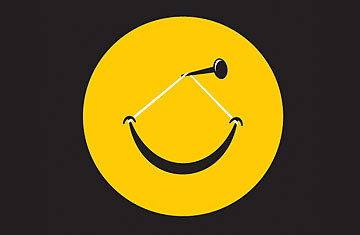
(2 of 5)
Hardwired for Hope?
I would have liked to tell you that my work on optimism grew out of a keen interest in the positive side of human nature. The reality is that I stumbled onto the brain's innate optimism by accident. After living through Sept. 11, 2001, in New York City, I had set out to investigate people's memories of the terrorist attacks. I was intrigued by the fact that people felt their memories were as accurate as a videotape, while often they were filled with errors. A survey conducted around the country showed that 11 months after the attacks, individuals' recollections of their experience that day were consistent with their initial accounts (given in September 2011) only 63% of the time. They were also poor at remembering details of the event, such as the names of the airline carriers. Where did these mistakes in memory come from?
Scientists who study memory proposed an intriguing answer: memories are susceptible to inaccuracies partly because the neural system responsible for remembering episodes from our past might not have evolved for memory alone. Rather, the core function of the memory system could in fact be to imagine the future — to enable us to prepare for what has yet to come. The system is not designed to perfectly replay past events, the researchers claimed. It is designed to flexibly construct future scenarios in our minds. As a result, memory also ends up being a reconstructive process, and occasionally, details are deleted and others inserted.
To test this, I decided to record the brain activity of volunteers while they imagined future events — not events on the scale of 9/11, but events in their everyday lives — and compare those results with the pattern I observed when the same individuals recalled past events. But something unexpected occurred. Once people started imagining the future, even the most banal life events seemed to take a dramatic turn for the better. Mundane scenes brightened with upbeat details as if polished by a Hollywood script doctor. You might think that imagining a future haircut would be pretty dull. Not at all. Here is what one of my participants pictured: "I was getting my hair cut to donate to Locks of Love [a charity that fashions wigs for young cancer patients]. It had taken me years to grow it out, and my friends were all there to help celebrate. We went to my favorite hair place in Brooklyn and then went to lunch at our favorite restaurant."
I asked another participant to imagine a plane ride. "I imagined the takeoff — my favorite! — and then the eight-hour-long nap in between and then finally landing in Krakow and clapping for the pilot for providing the safe voyage," she responded. No tarmac delays, no screaming babies. The world, only a year or two into the future, was a wonderful place to live in.
If all our participants insisted on thinking positively when it came to what lay in store for them personally, what does that tell us about how our brains are wired? Is the human tendency for optimism a consequence of the architecture of our brains?
The Human Time Machine
To think positively about our prospects, we must first be able to imagine ourselves in the future. Optimism starts with what may be the most extraordinary of human talents: mental time travel, the ability to move back and forth through time and space in one's mind. Although most of us take this ability for granted, our capacity to envision a different time and place is in fact critical to our survival.
It is easy to see why cognitive time travel was naturally selected for over the course of evolution. It allows us to plan ahead, to save food and resources for times of scarcity and to endure hard work in anticipation of a future reward. It also lets us forecast how our current behavior may influence future generations. If we were not able to picture the world in a hundred years or more, would we be concerned with global warming? Would we attempt to live healthily? Would we have children?
While mental time travel has clear survival advantages, conscious foresight came to humans at an enormous price — the understanding that somewhere in the future, death awaits. Ajit Varki, a biologist at the University of California, San Diego, argues that the awareness of mortality on its own would have led evolution to a dead end. The despair would have interfered with our daily function, bringing the activities needed for survival to a stop. The only way conscious mental time travel could have arisen over the course of evolution is if it emerged together with irrational optimism. Knowledge of death had to emerge side by side with the persistent ability to picture a bright future.
